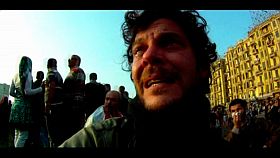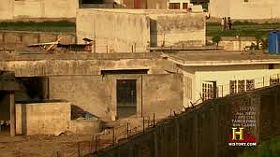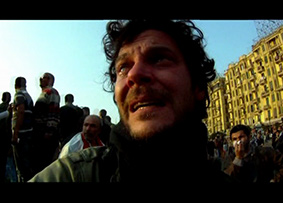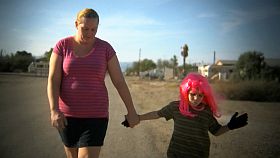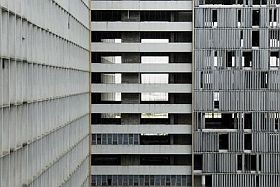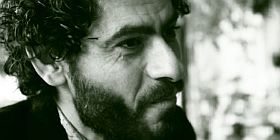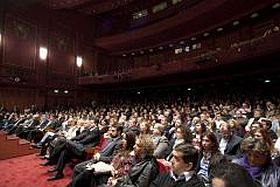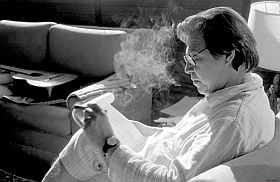


Documenting the Revolution/ 1
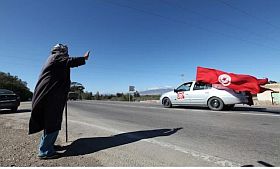
The cph:dox festival deserves credit for (also) putting a focus on the changes in the Arab world. With the support of IMS (International Media Support, Danish state supported organisation), no less than a dozen screenings and debates, entitled ”Free Radical”, were on the agenda of the festival, with many invited guests from the countries involved. I attended a handful of them as well as a very well visited seminar held by Danish newspaper Politiken, also a supporter of cph:dox, under the headline ”The Arab Spring and the new Media”, referring to the role of social media like Facebook and Twitter during the revolutions. This meeting included a panel of experts, university people of Arab origin living outside the region, plus Danish professor Jakob Skovgaard-Petersen who made a fine introduction to Syria and the website activity going on – the main source for information from a country closed for foreign press, many times linked on this site under ”The Syrian Revolution“.
I mention this because of the clear distinction in terminology and access between that – academic – panel and the bloggers, activists and filmmakers who took part in the festival. No, I am not saying that one is better than the other, only that you feel so strongly the difference between an inside and an outside look on the current affairs. Jon Alterman from Washington thought that the social media’s impact was quite overestimated, television’s role had been crucial for the changes in Tunisia and Egypt, Skovgaard-Petersen did not have the word ”revolution” on his power point presentation, he talked about ”the uprising” etc.
Orwa Nyrabia, however, Syrian film producer and co-organiser of the Dox Box festival, that has been running for four years in Damascus, unlikely of course to happen next year, did not hesitate to call the uprising ”a revolution”, and gave the audience a good intro to the situation in his country on two meeting occasions. One in connection with the screening of ”Life in a Syrian Village” by late master Omar Amiralay, and another when one of the dox:lab films were to be screened. Danish performance artist Lillibeth Cuenca was meant to be joined by her co-director, Syrian filmmaker Nidal Hassan, who did not arrive to Copenhagen as he was arrested in Damascus when he was about to get his travel documents cleared. The work-in-progress of the two was screened – it was less than promising from a film quality point of view. Nyrabia took the floor and informed with a lot of humour and sarchasm that there is nothing new in Syrian filmmakers being put into prison by the regime, that Nidal Hassan and others are grown up people, who know about the risk they are taking saying what they are saying against Assad and his dictatorship. There is no reason to feel guilty, he said to the Danish performer and others from the festival organisation, keep on inviting us so we can come and tell you what we know and see. Said Nyrabia, a very good friend, who I keep on naming ”the first minister of culture” in a new and free Syria!
The best session, however, was called ”Documenting the Revolution”. Clips, photos, film quoted were shown and the panelists helped each other to give a broad picture to the audience. In the panel were documentary filmmaker Elyes Baccar (Tunisia) (PHOTO from his Rouge Parole), journalist.
Thameur Mekki (Tunisia), film director and activist Lara Baladi (Egypt), and photographer and blogger Maggie Osama (Egypt). The two hour meeting started with the images from Cairo January 28, ”the Day of Anger”, where the police was attacking the people with guns and water canons on the bridge over the Nile. Enormously touching material that also shows praying people in the middle of the demonstration, with the crowd slowly winning the battle – at a certain moment the police tanks turn around and the walk to Tahir Square starts. These YouTube clips will get the same status as the man in front of the tank on Tiananmenh Square in Beijing in 1989. Go to YouTube..
The Tunisian filmmaker Elyes Baccar gave us the story of the Tunisian revolution that started with the self-immolation of Mohammed Bouazizi in Sidi-Bouzid, an event that was filmed and uploaded on the internet by his cousin Ali, later to be broadcast on al Jazeera, link to the YouTube version..
It sparked the revolution, uprisings in other cities of the country began, putting an end to the dictatorship of Ben Ali, who stepped down January 14, a month after the incident in Sidi-Bouzid. In the beginning, the director said, I was not a director, but a citizen, but gradually I felt that I had to film ”to feel that it was real”. He did and the very good result was shown at the festival in Copenhagen, ”Rouge Parole”, see review below.
Documenting the Revolution… as it was said in the panel, we have to go further than the news ”that is taking all humanity away”. We have ”to bring back basic things”, give a name to this person who is not just a number, said Elyes Baccar.
The Egyptian panelists added that we have to ”document before we forget”. Maggie Osama showed some of her strong photographs from Tahrir Square, and Lara Baladi informed about the group ”Tahrir Cinema” that was formed during the days of revolution. But now we see a counter-revolution, she said and reminded us about the massacre three weeks ago. ”The revolution is on the edge of being hi-jacked”, she said, ”it is a revolution in making, a work-in-progress”. Remember also that after the revolution there are still 12.000 people in prison.
The role of the media – we have to keep an eye on the development, said the Tunisians. We have now 101 political parties in the country and 60% of the television coverage in connection with the election was pro the islamists, said journalist Thameur Mekki, who also spoke about the complex role of the broadcaster al Jazeera in the region. Yes, they were promoting the islamists, but they were also the first that said yes to broadcast from Tunisia in December 2011 when it all started.
